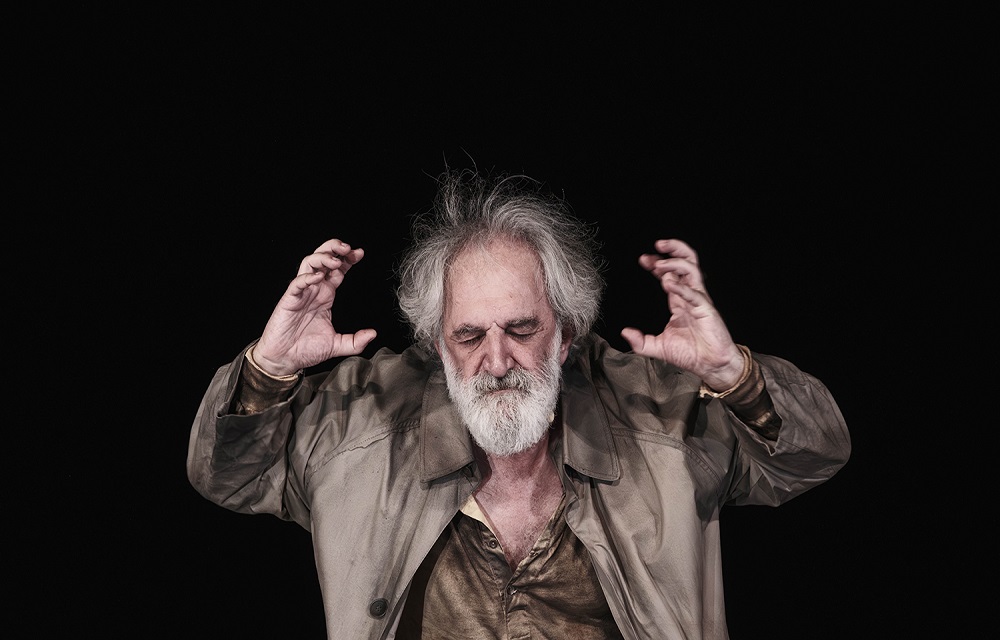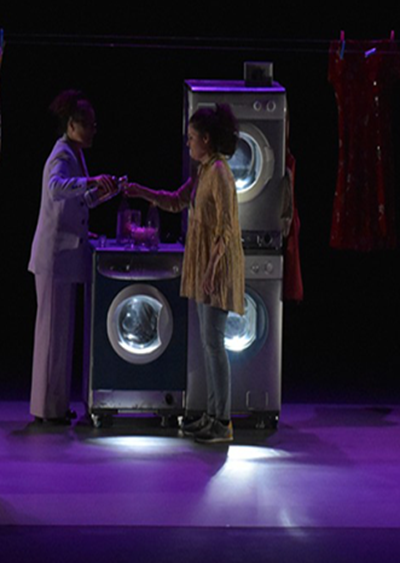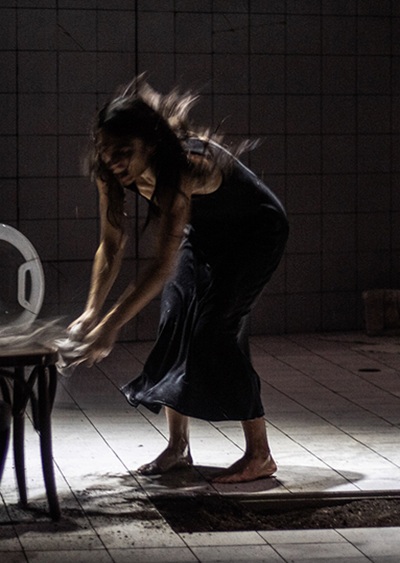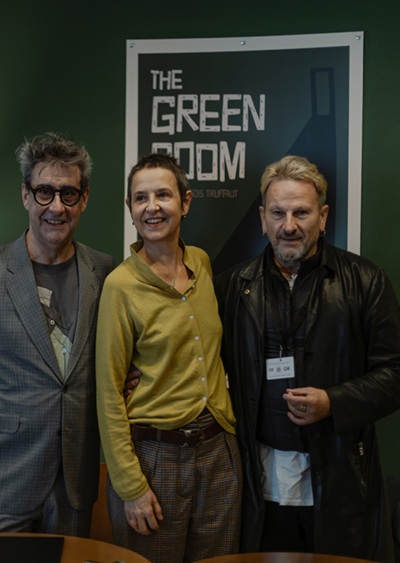
After its successful premiere at the Frynihos Theater of Delphi (July 27), the play Oedipus at Colonus by Sophocles, directed by Giorgos Skevas, enchanted the spectatorship of the Ancient Theatre of Epidaurus for two consecutive nights (August 4 and 5). The unrivaled aesthetics and excellent acoustics of the ancient theater, as well as the starry night along with a pleasant summer breeze enhanced furtherly the performances of the actors. For the spectators, the whole experience took on an almost ritualistic, religious dimension.
Dimitris Katalifos, one of the most important actors of the modern Greek theater, leads an exceptional troupe of actors who are called to give flesh and bones to the divinely inspired speech of the tragic poet. The last work composed by Sophocles returns to the myth of Oedipus and more specifically deals with the end of the cursed hero’s life, his exile and his plea to Theseus, king of Athens, to live out his last moments and be buried in the glorious city.
The director Giorgos Skevas avoided any post-modern or personal interventions on the classic text delivering to the audience a coherent performance, with breathtaking performances from the prologue of the tragedy through its mysterious epilogue. Despite the fact that the depiction of the Chorus of the Ancient Drama remains one of the greatest enigmas during the preparation of a modern stage proposal, the director was able – following faithfully the Sophoclean discourse as translated by Chryssa Prokopakis and Thanos Tsaknakis – to integrate it harmoniously, while the direction of the actors who make it up should be considered as excellent, since they really bring out the sense of the body of citizens who initially want to defend their city and then identify with the sufferings of Oedipus.
The protagonist of the show, Dimitris Katalifos, is in his first starring appearance in Epidaurus and shows the same indomitable hard work that characterizes all his work. His name, whether he appears on a Samuel Beckett existential comedy or an Arthur Miller drama, is synonym with a respect he shows for the language of the original texts and a characteristic finesse in the construction of a character. His role in Oedipus at Colonus, does not deviate from the above-mentioned rule. His articulation is so clear that all his words reach clearly even the ears of the viewer furthest from the stage, while the coloring of the play’s key phrases communicate Oedipus’ emotional state: from his gratitude towards Theseus to his distaste for his son, Polynices, for the fact that he and his brother valued power more than their tortured father.
In addition to this performance of amazing strength and stage economy of Dimitris Katalifos, it would be worth mentioning the rest of the cast. Angeliki Papathemeli and Alexandra Aidini, in the roles of Antigone and Ismene respectively, follow the footsteps of the balanced Sophoclean text, without resorting to melodramatic outbursts. The performance of Maximos Moumouris as Polynices, a determined young man who has to face both his brother’s competition and his father’s anger, should be considered excellent.
Moving on to a further evaluation of the rest of the elements that make up the theatrical performance, the sets and costumes designed by Lili Pezanou serve a double purpose: on the one hand, they harmonize with the earthy colors of Epidaurus (and by extension also of the other archaeological sites where the play will be performed), while at the same time highlighting the conflicts of the characters. More specifically, this becomes evident during the delineation and juxtaposition of Creon (black color in his attire) with Theseus (gray, confident tones for the righteous king of Athens). Christos Sapountzis in the role of Creon has captured the absoluteness of the dramatic person he plays, while Christos Chatzipanagiotis with his indisputable experience and his well-known persistence when studying a role gives perhaps his most important performance in an Ancient Greek Tragedy so far.
Overall, the play Oedipus at Colonus succeeds on every level. From the protagonist and the supporting roles of the drama, to the directing approach that achieves something that is increasingly rare in modern interpretations of Ancient Greek Drama: to highlight the words bequeathed to us by great spirits of ancient Greek culture, such as Sophocles, as the omnipresent protagonist who flies above the spectators, with the sole purpose of enthralling them.
Cast and Crew
Translated by: Chryssa Prokopaki, Thanos Tsaknakis
Directed by: Giorgos Skevas
Adaptation: Giorgos Skevas, Chryssa Prokopakis
Set and Costume design by: Lily Pezanou
Music by: Simi Tsilalis
Lighting Design by: Lefteris Papadopoulos
Kinesiology by: Damiano Ottavio Bigi
Photos by: Patroklos Skafidas
A production of the Cultural Organization “Lykofos in collaboration with the Athens Epidaurus Festival
NEXT STATIONS OF THE TOUR
Heraklion
Tuesday 08/08/23, 21:00
NIKOS KAZANTZAKIS OPEN AIR THEATRE
RETHYMNO
Wednesday 09/08/23, 21:00
FORTEZZA/ EROFILI MUNICIPAL THEATER
CHANIA
Thursday 10/08/23, 21:30
EAST MOAT THEATER
PREVEZA
Wednesday 16/08/23, 21:00
ROMAN ODEUM OF NICOPOLIS
ELIS
Thursday 17/08/23, 21:00
ANCIENT THEATER OF ELIS
KALAMATA
Friday 18/08/23, 21:00
CASTLE OF KALAMATA
VOLOS
Saturday 26/08/23, 21:00
SUMMER MUNICIPAL THEATER “MELINA”
KAVALA
Sunday 27/08/23, 21:00
ΑNCIENT THEATRE OF PHILIPPI
THESSALONIKI
Monday 28/08/23, 21:00
KRATIKON THEATRO DASOUS
IOANNINA
Tuesday 29/08/23, 21:00
OUTDOOR THEATRE EHM =
PETROUPOLI
Monday 04/09/2023, 21:00
PETRA’S THEATER
LARISSA
Thursday 07/09/2023, 21:00
ALKAZAR THEATER
VYRON
Tuesday 12/09/2023, 21:00
ΤHEATRO VRACHON MELINA MERKOURI
ATHENS (THE ACROPOLIS)
Saturday 02/09/2023, 21:00
ODEON OF HERODES ATTICUS







Leave A Comment